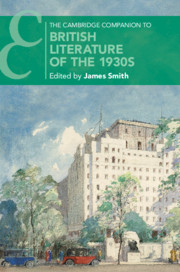Book contents
- The Cambridge Companion to British Literature of the 1930s
- The Cambridge Companion to British Literature of the 1930s
- Copyright page
- Contents
- Notes on Contributors
- Introduction
- Chapter 1 Poetry
- Chapter 2 The Literary Novel
- Chapter 3 Drama
- Chapter 4 Publishing and Periodicals
- Chapter 5 The Middlebrow and Popular
- Chapter 6 Modernism
- Chapter 7 Communism and the Working Class
- Chapter 8 Empire
- Chapter 9 Travel
- Chapter 10 The Regional and the Rural
- Chapter 11 The Queer 1930s
- Chapter 12 Remembering and Imagining War
- Chapter 13 Fascism and Anti-Fascism
- Chapter 14 Fashioning the 1930s
- Index
- Cambridge Companions to …
Chapter 11 - The Queer 1930s
Published online by Cambridge University Press: 18 December 2019
- The Cambridge Companion to British Literature of the 1930s
- The Cambridge Companion to British Literature of the 1930s
- Copyright page
- Contents
- Notes on Contributors
- Introduction
- Chapter 1 Poetry
- Chapter 2 The Literary Novel
- Chapter 3 Drama
- Chapter 4 Publishing and Periodicals
- Chapter 5 The Middlebrow and Popular
- Chapter 6 Modernism
- Chapter 7 Communism and the Working Class
- Chapter 8 Empire
- Chapter 9 Travel
- Chapter 10 The Regional and the Rural
- Chapter 11 The Queer 1930s
- Chapter 12 Remembering and Imagining War
- Chapter 13 Fascism and Anti-Fascism
- Chapter 14 Fashioning the 1930s
- Index
- Cambridge Companions to …
Summary
It is today often presumed – by, for instance, the Oxford English Dictionary – that the term ‘queer’ only began to be reclaimed with pride in the 1980s. But as queer historians have long recognised, this is in fact inaccurate, for a more or less defiant use of this term as a self-descriptor dates at least as far back as 1939, to Christopher Isherwood’s Berlin Stories. It is, therefore, not so much an anachronism as a historical imperative to affirm the 1930s as queer. Indeed, given the prominence of a particular group of left-wing writers, including Isherwood himself, W. H. Auden, and Stephen Spender, the 1930s have often been categorised as a ‘pink decade’: as, in other words, foundational for twentieth-century queer literature, politics, and culture in Britain.
- Type
- Chapter
- Information
- The Cambridge Companion to British Literature of the 1930s , pp. 175 - 190Publisher: Cambridge University PressPrint publication year: 2019

